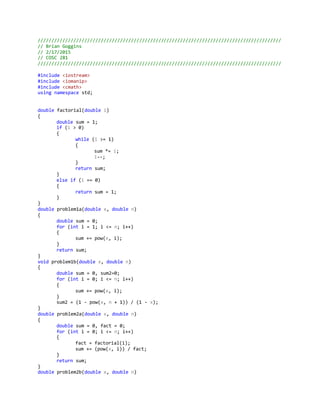
cosc 281 hw3
- 1. ///////////////////////////////////////////////////////////////////////////////////////// // Brian Goggins // 2/17/2015 // COSC 281 ///////////////////////////////////////////////////////////////////////////////////////// #include <iostream> #include <iomanip> #include <cmath> using namespace std; double factorial(double i) { double sum = 1; if (i > 0) { while (i >= 1) { sum *= i; i--; } return sum; } else if (i == 0) { return sum = 1; } } double problem1a(double x, double n) { double sum = 0; for (int i = 1; i <= n; i++) { sum += pow(x, i); } return sum; } void problem1b(double x, double n) { double sum = 0, sum2=0; for (int i = 0; i <= n; i++) { sum += pow(x, i); } sum2 = (1 - pow(x, n + 1)) / (1 - x); } double problem2a(double x, double n) { double sum = 0, fact = 0; for (int i = 0; i <= n; i++) { fact = factorial(i); sum += (pow(x, i)) / fact; } return sum; } double problem2b(double x, double n)
- 2. { double sum = 0, fact = 0; for (int i = 0; i <= n; i++) { fact = factorial(2*i); sum += ((pow(-1, i)) / (fact))*(pow(x, 2 * i)); } return sum; } double problem2c(double x, double n) { double sum = 0, fact = 0; for (int i = 0; i <= n; i++) { fact = factorial((2 * i) + 1); sum += ((pow(-1, i)) / (fact))*(pow(x, (2 * i) + 1)); } return sum; } double problem3(double n) { double sum = 0, fact = 0; for (int i = 0; i <= n; i++) { sum += pow(-1, i) / ((2*i)+1); } return sum; } int main() { int exit1 = 0; double answer = 0, answer2 = 0, pi=4*atan(1); while (exit1 != 1) { //problem 1 answer = problem1a(3, 3); cout << "(A) " << answer << endl; answer = problem1a(3, 7); cout << "(B) " << answer << endl; answer = problem1a(.2, 3); cout << "(C) " << answer << endl; answer = problem1a(.2, 7); cout << "(D) " << answer << endl; //problem 2 //a answer = problem2a(0, 6); answer2 = exp(0) - answer; cout << "n(A) N1=6 x=0 ttf(x)=" << answer << "ttt" << fabs(answer2) << endl; answer = problem2a(1, 7); answer2 = exp(1) - answer; cout << "(A) N1=7 x=1 ttf(x)=" << answer << "tt" << fabs(answer2) << endl; //b
- 3. answer = problem2b(0, 6); answer2 = cos(0) - answer; cout << "n(B) N1=6 x=0 ttf(x)=" << answer << "ttt" << fabs(answer2) << endl; answer = problem2b(pi/4, 3); answer2 = cos(pi / 4) - answer; cout << "(B) N1=3 x=pi/4 tf(x)=" << answer << "tt" << fabs(answer2) << endl; answer = problem2b(pi/2, 4); answer2 = cos(pi / 2) - answer; cout << "(B) N1=4 x=pi/2 tf(x)=" << answer << "t" << fabs(answer2) << endl; //c answer = problem2c(0, 6); answer2 = sin(0) - answer; cout << "n(C) N1=6 x=0 ttf(x)=" << answer << "ttt" << fabs(answer2) << endl; answer = problem2c(pi/4, 2); answer2 = sin(pi / 4) - answer; cout << "(C) N1=2 x=pi/4 tf(x)=" << answer << "tt" << fabs(answer2) << endl; answer = problem2c(pi/2, 4); answer2 = sin(pi / 2) - answer; cout << "(C) N1=4 x=pi/2 tf(x)=" << answer << "ttt" << fabs(answer2) << endl; //problem 3 answer = 4*(problem3(1000000)); fabs(pi - answer); cout << "n(A) N=1000000 tt" <<fabs(pi - answer) << endl; cout << "(B) Pi = " << setprecision(20) << pi << endl; cout << "close<1> "; cin >> exit1; } return 0;} OUTPUT (A) 39 (B) 3279 (C) 0.248 (D) 0.249997 (A) N1=6 x=0 f(x)=1 0 (A) N1=7 x=1 f(x)=2.71825 2.78602e-005 (B) N1=6 x=0 f(x)=1 0 (B) N1=3 x=pi/4 f(x)=0.707103 3.56636e-006 (B) N1=4 x=pi/2 f(x)=2.47373e-005 2.47373e-00 (C) N1=6 x=0 f(x)=0 0 (C) N1=2 x=pi/4 f(x)=0.707143 3.62646e-005 (C) N1=4 x=pi/2 f(x)=1 3.54258e-006 (A) N=1000000 9.99999e-007 (B) Pi = 3.1415926535897931 close<1> Pi approximation 3.14159 26535 89793 23846 26433 83279 50288 41971